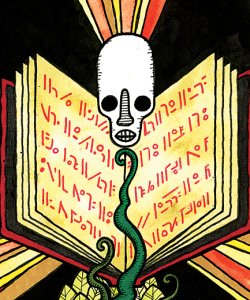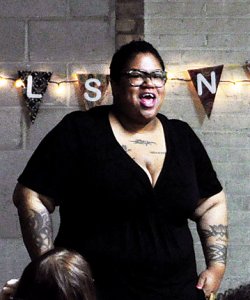The Miracle of Mentors: From the Hard Life to the Writing Life
After years of personal struggles including drug abuse and run-ins with the law, a poet meditates on the mentors who helped carry him toward the creative life.
Jump to navigation Skip to content
Articles from Poet & Writers Magazine include material from the print edition plus exclusive online-only material.
After years of personal struggles including drug abuse and run-ins with the law, a poet meditates on the mentors who helped carry him toward the creative life.
Writers have been self-publishing since the beginning of written words. Celebrating those creative individuals determined to be heard, we present a timeline of notable moments in self-publishing history.

Kate Gale, the cofounder and managing editor of the Pasadena, California–based Red Hen Press, which celebrates its twentieth anniversary next year, discusses the press's history, growth, and the keys to its success.

Self-published author Jennifer Ciotta, literary agent Kristin Nelson, and independent publishing entrepreneur Richard Nash discuss the creative opportunities, challenges, and rewards of self-publishing.
Small Press Points highlights the innovation and can-do spirit of independent presses. This issue features Midwestern Gothic, a Chicago–based micro press dedicated to publishing new writing by Midwestern writers.

Visual artist Matt Kish follows up his celebrated Moby-Dick in Pictures with another illustrated classic, Joseph Conrad's Heart of Darkness, which will be published in November by Tin House Books.
With so many good books being published every month, some literary titles worth exploring can get lost in the stacks. Page One offers the first lines of a dozen recently released books, including Daniel Alarcón’s At Night We Walk in Circles and Carmen Giménez Smith's Milk and Filth, as the starting point for a closer look at these new and noteworthy titles.
Literary MagNet chronicles the start-ups and closures, successes and failures, anniversaries and accolades, changes of editorship and special issues—in short, the news and trends—of literary magazines in America. This issue's MagNet features Fence, Sleepingfish, PANK, Eleven Eleven, and Hobart.
The New Heave-Ho, a PDF-only poetry press founded by poet Noel Black, aims to deliver poetry collections to the masses in free and by-donation PDF format.

The strange and beautiful universe of Denis Johnson’s fiction is marked by the enduring appeal of his 1992 story collection, Jesus’ Son.

The live storytelling scene, commonly known as Live Lit, has taken off in Chicago, often boasting more than fifty shows a month in the Windy City.

The Unterberg Poetry Center at the 92nd Street Y in New York City kicks off a season of special events in honor of its seventy-fifth anniversary, starting with an exhibit of rare photos, letters, and ephemera from the center's storied past.

In the second installment of Where We Write, a fiction writer takes a trip back home to Hannibal, Missouri, the boyhood home of Mark Twain and the town that still inspires her work, long after she's moved away.

Chris Parris-Lamb of the Gernert Company offers advice on submitting query letters and manuscripts, and when to embrace or eschew self-promotion.
A poet with two published books but no MFA, Leigh Stein has nevertheless benefited from the proliferation of creative writing programs.

The responsibility that Jesmyn Ward feels toward the Southern town where she was born shapes not only her new memoir, Men We Reaped, but also where and how she lives her life.
With so many good books being published every month, some literary titles worth exploring can get lost in the stacks. Page One offers the first lines of a dozen recently released books, including David Vann’s Goat Mountain and Jhumpa Lahiri’s The Lowland, as the starting point for a closer look at these new and noteworthy titles.

Visual artist Jonathan Allen and poet Anselm Berrigan team up to create LOADING, an exhibit in New York City that will be published in book form this fall by Brooklyn Arts Press.
Small Press Points highlights the innovation and can-do spirit of independent presses. This issue features A Strange Object, which publishes works of fiction in both print and digital editions from its headquarters in Austin, Texas.

In an effort to preserve her grandmother’s legacy, Brooklyn–based poet and visual artist Bianca Stone is working to turn the late Ruth Stone’s Vermont house into a writers center and residency.

Ecological artist and sculptor Ana Flores connects communites to the land around them through a series of installations that combine poetry, visual art, and nature observation.

Poet Robert Polito brings his years of experience in New York City's writing community to Chicago, where he succeeds John Barr as the president of the Poetry Foundation.

A vice president and executive editor at Knopf, Jordan Pavlin discusses her terror of launch meetings, the particular genius of Sonny Mehta, and her job as a writer’s ideal reader.
Literary MagNet chronicles the start-ups and closures, successes and failures, anniversaries and accolades, changes of editorship and special issues—in short, the news and trends—of literary magazines in America. This issue's MagNet features Salmagundi, the Threepenny Review, Georgia Review, and Image.
Micropublishers secure their spot on the digital landscape by creating new apps that deliver carefully curated content to readers' mobile devices.